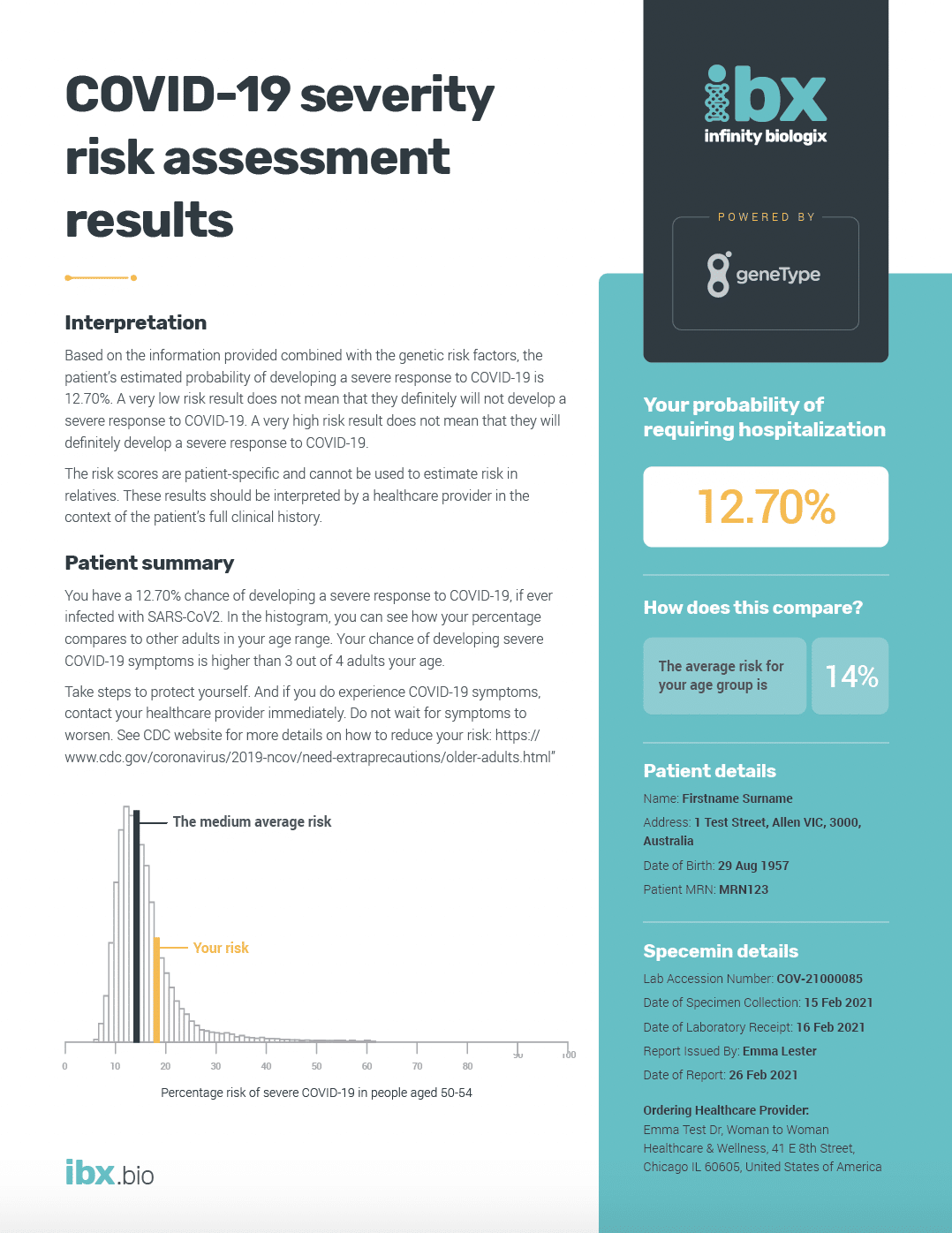Find out about your risk of developing severe COVID-19. And take action today.
GeneType is pleased to offer the world’s first COVID-19 risk test, through genetic testing that estimates your personal risk of hospitalization if you were to be infected with SARS-CoV-2.

It’s not just age that increases the risk of developing severe symptoms if infected with SARS-CoV-2.¹
You’ve probably also heard of other risk factors, or “comorbidities.” Hypertension, diabetes, and respiratory disease are among some common comorbidities.¹

DNA
Small changes in our DNA have a strong link to COVID-19 severity

Clinical history
Medical risk factors can impact COVID-19 severity
GeneType for COVID-19 Severity provides simple, actionable results.
GeneType for COVID-19 Severity helps you and your health professional translate your clinical and genetic data into an actionable risk management plan.
Our risk assessment takes into account 16 comorbidities and genetic markers that have been associated with patients who develop severe disease.
Personalized risk score. Personalized health plan.
GeneType for COVID-19 Severity allows us to identify adults in our community at greater risk of developing severe symptoms requiring hospitalization.
This can help us protect our population including front-line workers by identifying the most vulnerable.
Understanding who among us is most at risk for severe disease allows us to take risk-based precautions, encourage vaccination, and start treatment early if infection does occur.

GeneType testing is simple

Step 1
Purchase your geneType test kit via this website

Step 2
Complete a simple questionnaire, spit in the tube provided and return both to geneType

Step 3
When your results are ready, you will be notified by our clinical partners.
Have questions? We have answers.
If we haven’t answered your question, contact us directly.
What will my geneType for COVID-19 Severity results tell me?
Your test will tell you your risk of developing severe COVID-19, if ever infected with SARS-CoV-2. The score is calculated by combining all of your personal health risk factors with your personal genetic risk markers. We then compare your risk to all of the other adults of your same age and ethnicity. If you are at higher than average risk of developing severe disease, it is important to seek medical attention as soon as you think you might have been infected. There are treatments such as monoclonal antibodies that, if taken early enough, are very effective. If you are already vaccinated, or have previously been infected with SARS-CoV-2, this test does not account for the potential immunity you have developed as a result of that event.
If my risk of developing serious COVID-19 is not elevated, do I still have to worry about contracting it?
Yes. You should still take precautions against contracting SARS-CoV-2. Even if you are not at high risk of developing severe COVID-19, you are still at some risk. The best way to protect yourself from potential hospitalization is to get vaccinated. If you do become ill with COVID-19, do not hesitate to go to the doctor if your symptoms worsen. You may still benefit from monoclonal antibody therapy to help your body fight the virus.
What ethnicities are eligible for geneType for COVID-19 Severity?
All ethnicities are eligible for this test. A few of the genomic markers of risk may not be relevant to your ethnicity, but the clinical risk factors will still provide significant value to your risk score.
What do I do with my test results?
You can discuss your results with your healthcare provider. If you are under 65 and at increased risk of developing severe COVID-19, speak with your doctor about your vaccination status and your booster shot. If you are at increased risk, be mindful of your surroundings, wear a mask when possible, and if you do develop COVID-19 symptoms, seek medical attention immediately.
Will insurance cover this test?
No, insurance does not currently cover this test.
How will my data be used?
Safeguarding the privacy and security of personal health information is among our most important responsibilities. You can access our testing partner’s privacy policy at https://vitagene.com/privacy/
What is ongoing research and why is it important?
If you are interested in participating in ongoing research studies, agree to the “secondary research” consent when you order your test. You may be requested to fill out an additional questionnaire at a later date. Your personal information and specimen will be de-identified, meaning a researcher will not be able to link your data back to you. Research data is important to help us better understand who gets really sick compared to those who do not get any symptoms. If you change your mind, you may remove yourself from the study at any time by emailing support@genetype.com.
Know your COVID-19 severity risk and take action.
References
- AIHW 2021. The first year of COVID-19 in Australia: direct and indirect health effects. Cat. no. PHE 287. Canberra: AIHW.

Coming Soon
GeneType Multi Test
A combination of geneType tests for breast cancer, colorectal cancer, ovarian cancer, prostate cancer, coronary artery disease and type 2 diabetes in a single test.
Know your risk of a serious disease to tailor a personalised prevention plan with your doctor.
Keep up-to-date with our latest advances
Sign up to our newsletter to stay informed about our latest advances and how these could support your practice.





